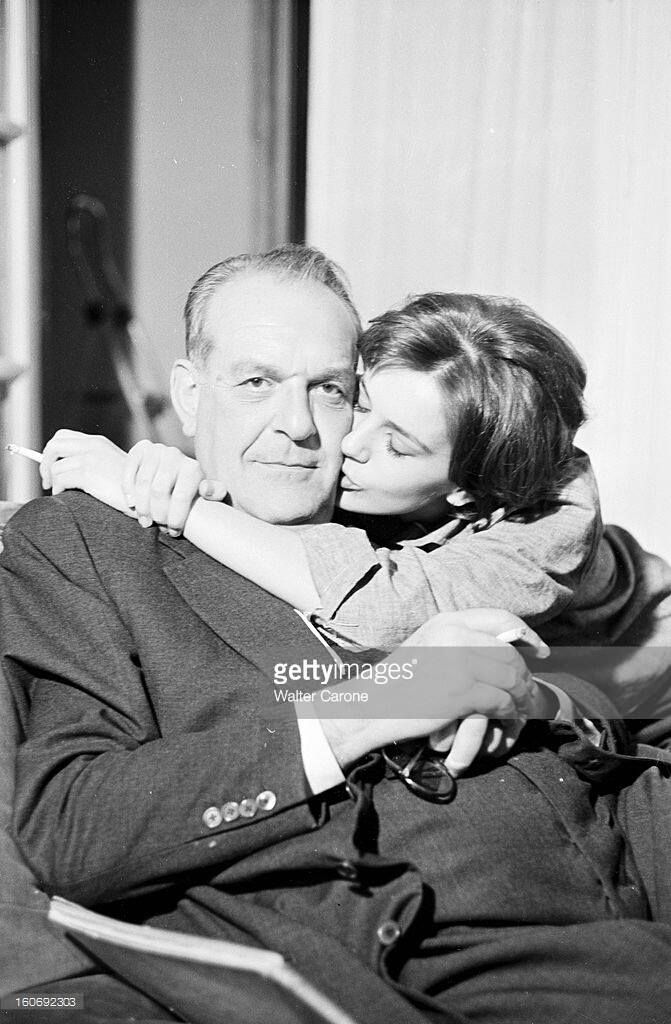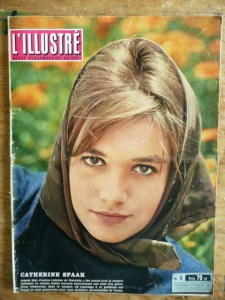I was wondering why my posts about Catherine Spaak received such a huge uptick in views these last couple days, and after a quick Google search I learned that she passed away on Easter Sunday. I usually find myself unmoved by celebrity deaths regardless of my appreciation of their work, but this one hits pretty hard. Spaak’s films played a huge role in making the pandemic bearable for me. Tracking them down one by one was something to get excited about; they made for a fascinating rabbit hole of unknown (to Americans) masterpieces which deeply inspired me on a personal and artistic level. After running low on American classics to discover, and growing bored by Hollywood conventions besides, Italian cinema has made movies feel exciting again to me, and her filmography is a big part of that. I consider her very first film, I Dolci Inganni, to be my new all-time favorite alongside Vertigo.
After an excerpt of my Femina Ridens review was recently included on the spectacular blu-ray release from Mondo Macabro, I mentioned to a friend in passing that the only greater honor would be if Spaak herself stumbled unto my essays about her career and reached out to say she appreciated them. This was always an unlikely fantasy, perhaps a bit narcissistic even, but once the idea was in my head I couldn’t help but hope for it nonetheless. I was actually in the process of learning Italian so I could understand her films that have never been subtitled to English, read my copy of her autobiography, and be able to write her a fan letter. I can’t help but feel depressed that won’t happen now.
It’s hard to gain even more respect for a woman whom I already knew as an accomplished actress, singer-musician, writer and TV host, but what cemented Catherine Spaak as one of my all-time idols is that she overcame so much at a young age. Specifically, I learned a few months after posting my review of La Voglia Matta* that Spaak was unfortunately molested early in the production by costar Ugo Tognazzi. She toughed it out and made the film anyway, having to cozy up with, and smile at, the much older man who made her skin crawl. Seeing that movie for the first time, I had absolutely no idea how much she must have loathed him and I still find no traces of it watching again with the benefit of foreknowledge. If that isn’t a testament to what a fantastic actress she was (at 16 no less!) then I don’t know what is. She never should have had to deal with that kind of situation–especially at such an age–but she did, and rose above it.
*ASIDE: I didn’t amend my old review of Crazy Desire with this information so as not to discourage others from enjoying it, because this really is a great film taken on its own artistic merits, and Spaak’s performance deserves to be appreciated despite what some hardcore fanatics of cancel culture might think. That said, I was originally planning on exploring Tognazzi’s career on my blog with the same thoroughness and reverence as Spaak’s, but shelved the idea upon the revelation that he was a creep.
For the sake of thoroughness, I then went out of my way to seek unflattering anecdotes of her in turn, and couldn’t find a single one. No record of instability, entitled rudeness nor drug abuse, as is common of people who grew up with fame. By all accounts, she seems to have been a very classy lady; a rare example of an accomplished renaissance woman, and she was strong as nails to boot. Catherine Spaak comes off as fairly humble, principled and down to Earth in the interviews I’ve read too. So, to honor her memory further, I’m going to mark this solemn occasion by finally commenting on the rest of Spaak’s ’60s filmography I own that have accompanying English subtitles. (Plus a few that don’t.) I will also discuss my ongoing search efforts for her father’s sole directorial feature.


Le Mystère Barton (1949) The Barton Mystery aka Per L’onore di mia Figlia (“For My Daughter’s Honor”)
My most recent lost media search pertains to this, Charles Spaak’s sole foray into directing after a successful screenwriting career. This film was produced by Alexandre Kamenka (I’ve seen at least one other source mention a Pierre Blancheville and André Cornu involved as well). The production companies were Alkam Films and Radio-Cinema, but it’s hard to find information on either of them. By all accounts, Barton was not a popular or successful feature in its time and today it’s downright forgotten, with no reviews, ratings or even a plot summary on IMDb. It was based on a play of the same name from 1916 by Walter C. Hackett that’s sort of a whodunit murder mystery / comedic farce. Interestingly, there were two other adaptations of the same story before this one, from 1920 and 1932, and both are equally as obscure. It has never been released on home media of any kind and I can’t find clips, trailers, screencaps or a soundtrack–only some posters to prove it existed. There’s a website which catalogs contemporaneous reviews the film received, listing the issues of five publications and the authors who wrote them, but I can’t access the actual text.
Through the course of my research, I found the proper name for “Alkam Films” is actually SOCIETE DES FILMS ALKAM and they went out of business as of 1984. Even on French google, searching this production company only brings up 19 results, most of which are useless. Radio Cinema, the other production (or perhaps distribution) company has such a generic name that it’s hard to get information on them. I was only able to find two useful websites in fact, the first is this pdf which relays a brief period of the company’s history in French; I can’t read it, but it’s something. Even better, I found this website that revealed Radio-Cinema was actually a subsidiary of a larger company called “General Wireless Telegraphy Company” or CSF. (Why that acronym, I have no idea.) This parent-company then merged with another called “Thomson-Brandt” to form “Thomson-CSF.” In 2000, this conglomerate was rebranded as the “Thales Group” which is still around today. That means, not only is everyone involved in the production long dead, but the companies who made it are technically gone too. Not a good sign.
Who the hell knows what happened to the rights (much less the physical film) of Barton with all this corporate restructuring over the decades. It seems like Thomson-CSF was more into defense and aerospace technology than entertainment media, so it’s possible they neglected or sold off the rights to the old film catalog they inherited from Radio-Cinema. Nevertheless, it’s the best lead we now have. I’ve contacted them but have yet to hear back and to be brutally honest I don’t expect an answer. In fact, I doubt they’d even know what I’m talking about anymore, considering Barton is, at the end of the day, a long forgotten flop with zero market value from a time when film was considered disposable, made by a small subsidiary of their preceding corporate entity. It’s very unclear because of the way the site is written/laid out, but according to one additional source, it might be possible that a “Mondial Films” re-released Barton in 1990. I can’t find any info on this supposed company though, nor any corroborating sources on a rerelease.
It pains me to say this, but considering the circumstances I think this one is actually lost lost, not just unavailable to the public. While I’m not expecting to find a masterpiece by any means, it’s still a special case for me because of the tangential relationship with my favorite actress. I’d like to bring it back to the public so as to cement Charles Spaak’s legacy; in my eyes, he deserves it for raising such an inspiring figure. If it should ever be found, I only regret she did not live to see it.


Le Puits aux Trois Vérités (1961) Three Faces of Sin
The most interesting thing about this film is that it represents a brief early detour to France before she returned to the peninsula. According to interviews I’ve seen, Spaak decided to work in Italy so as to make her own way in the world and not be seen as nepotistically relying on her father’s connections in the French film industry. I respect that, and I’m glad she did because Italian cinema tends to be much more enjoyable than any French films I’ve yet seen.
One thing I really dislike is how this movie begins with a murder and then immediately works its way backwards in time to see how we got to it. This technique is so pretentious and cliché, it’s even famously lampooned in Rick and Morty. It’s such a desperate plea for attention (“No, don’t leave, someone’s gonna die! Isn’t that exciting!?”) when a writer/director doesn’t believe their own story can hold our attention long enough to get to the climax. The only film I can think of off the top of my head where this kind of works is Citizen Kane, similar to how The Wizard of Oz is the only movie where the “it was all a dream” ending doesn’t feel like a huge copout. This narrative device didn’t even suit Kubrick, indisputably an all-time great director, when he tried it in Lolita. (Which is a movie I mostly enjoy, besides the prologue and overemphasis on Clare Quilty, but that’s another story…)
I bring up Lolita specifically because the plots are very similar: a man uses an unattractive, unattached middle-aged woman to get at her vulnerable young daughter. In this film, he marries the daughter (named Danielle, played by Spaak) while the mother is still alive, causing a fallout. We know Danielle dies in the end, and we get both the mom and husband’s testimonies (shown as extended flashbacks) of how that happened, punctuated by excerpts from the girl’s diary. This all sounds like it would make for a gripping narrative, but it just isn’t, largely because of the cumbersome framing device and subsequently awkward pacing. Danielle is a sympathetic child, whose diary reveals a great empathy and wit beyond her years. It’s tragic that she was caught between the petty machinations of two selfish adults, which feels like an allegory for how the next generation is always re-traumatized by those who came before. I liked Danielle very much, I felt her pain, I just wish the rest of the film did her justice.
I think Spaak did a great job playing the role of a very young girl caught between her husband’s two-timing and her mother’s jealousy over their relationship. There are scenes where she conveys the stifled turmoil of a person who knows their partner is being disingenuous, who wants the marriage to work, but is beginning to doubt whether it can. Anyone who’s ever been in a slow-motion break up of a toxic relationship knows this torture, where you’re trying to give 110% to someone who refuses to meet you halfway. Overall, the performance shows what Catherine could do even at 15 years old. She was a natural born actor who, even then, understood the importance of subtlety in a performance. (Her two costars in this film apparently missed that lesson.)




Il Sorpasso (1962) The Easy Life
Out of all the movies in this list, Il Sorpasso is my favorite by far. Catherine’s in a supporting role and it’s really more of a buddy movie between Jean-Louis Trintignant and Vittorio Gassman’s characters. I’ve compared it to Planes, Trains and Automobiles without the feel good ending or unambiguously positive relationship between the two leads. That’s because Bruno (Gassman) is at best an affable lout, someone who pushes people around for his own amusement despite his superficial charm. If Bruno were a real person, he’d be fun to hang out with for an hour or so, but over time his various inconsiderate mannerisms would turn most anyone off. He’s the kind of guy whom you can’t help but root for on some level, but you have to bounce before he drains you of all your money, patience and dignity.
His new friend, or victim, is Roberto (Trintignant) a soft-spoken, mild-mannered wallflower with few social skills. Roberto lacks the confidence or drive to make things happen for himself, and just passively goes through life admiring women from afar. To some extent, Roberto needed a guy like Bruno to kick him into shape, but Bruno is still ultimately using him for a good time and takes things way too far. Roberto tries to get away multiple times when Bruno’s back is turned, but lacks the courage to stand up to him directly and doesn’t take the red flags seriously enough. When a man’s long suffering and otherwise reasonable wife warns you that he’s trouble, you should listen. It pains me to admit it, but I’ve been the Roberto in this story to one or two Brunos in my life and it isn’t fun for long. The best thing I can say about my Bruno is that he put me in touch with a gorgeous woman whom I never would have had the nerve to talk to otherwise.
When Spaak does show up over halfway through the film, she edges out a spot in the limelight and feels like an intrinsic part of the story rather than an afterthought. She plays Lilli, Bruno’s disillusioned-but-not-demoralized daughter. It’s apparent that her character has dad issues from the way she holds him at arms length, plus the fact that she’s dating an 80 year old man. Nevertheless, Lilli has a plan for her own future and is well on her way to achieving it without a paternal influence in her life. She isn’t in the film long enough for Spaak to create a persona that’s quite as memorable as both Francescas, Dora or Mimi, but she has screen presence up the wazoo. She represents the opportunity both men squandered because of their character flaws: Bruno lost out on knowing his intelligent, ambitious daughter while Roberto is too pathetic to impress her. (Just as he’s awkward around other women.) A more conventional Hollywood film would have had Roberto and Lilli hook up and rescue each other from Bruno’s rampaging lifestyle, but Italian films are much more true to life.
L’amore Difficile (1962) Sex Can Be Difficult
This is yet another omnibus film, which means multiple unrelated short stories packaged together as one. I have yet to see a “package film” I’ve truly enjoyed from either side of the Atlantic. I hate the ones from Disney in the ’40s, I dislike all the Italian examples I’ve watched, nor was I a big fan of Twenty Bucks (1993). In this instance, I limited myself to watching the segment with Catherine Spaak, entitled “The Women.” This segment is not only short, it’s lowkey in its execution. There’s no real soundtrack, camera work or big emotions for the actors to work with, so it relies on the script to entertain the audience. It stars another favorite Italian actor of mine, Enrico Maria Salerno, as L’uomo. His character is an aging bachelor, who’s sort of lackadaisically playing the field. He dates women and leaves them hanging for months at a time, but when he gets bored enough to call them again he finds that they’ve moved on, or are similarly nonchalant towards him in turn. He calls up an old half-forgotten flame to find that she’s married now, much to his disappointment. She goes to bed with him all the same, albeit without much passion. Then he meets up with Spaak’s character, his current squeeze, and wonders if she’d ever two time him if they were to get hitched. It’s almost like he projects his own lack of devotion onto her, because despite having Catherine freakin’ Spaak on his arm, the guy still openly gazes at other women right in front of her.
The male character is aimless, full of doubts and contradictory thoughts. The women are making themselves sexually available, but without the spark of love he seems to want. He gets in bed with both of them, but the heart of the first belongs to another man, which seems to leave him unsatisfied. And the second, while still single and inexperienced, has already shed her youthful vigor for detached cynicism. She complains about her skin losing its glow, and compares sex to getting “a skin treatment,” implying it’s solely for her sake and not for any kind of deep connection with her partner. (That anecdote almost makes her come off like a succubus feeding on this man’s life energy.) The guy has access to carnal pleasure but not love, and it leaves him feeling empty. He holds women at arms length but is upset when they do the same to him, as a sort of karmic comeuppance. I almost wonder if he really chose to sleep around or if he’s forced to because every date he’s ever had has been shallow, fair-weather and obtuse. (If so, I can absolutely relate to his pain, because modern dating is an existential anguish.) The story seems to be saying that we create the unhappiness we see in the world, and it makes us unhappy in turn.
It’s a nice enough story if not especially gripping. Spaak is fine but it’s not one of her more memorable performances due to its brevity. She also doesn’t have the energy or the charming demeanor of her better roles, but admittedly that seems to be what the story is going for, so mission accomplished I guess. While I’m glad she’s in it, if I’m being honest this part could have been played by any actress and little would have been lost for it, minus her uniquely captivating beauty. The character is more of a two-dimensional stand-in for all jaded young women on the dating market than a fleshed out three-dimensional person worthy of deep analysis.
Week-end à Zuydcoote (1964) Weekend at Dunkirk
This is one of those movies, like The Man With The Balloons, where Spaak plays a lesser role that doesn’t give her as much to do. She only has maybe 20~30 minutes of screentime scattered throughout, it’s not really her movie. I liked it ok, but I really don’t have much else to say beyond that. It’s just not my kinda film, I’m only watching it for Spaak and she doesn’t get to play an especially interesting role…so what’s the point? Anyway, they can’t all be interesting.
One of my biggest small pet peeves about the world we live in is this perception that blondes are hotter and more “fun” while brunettes are plain and boring. The number of references to this bias in media are too great to count and they always take me out of what I’m watching for a second as I roll my eyes. I’ve known so many beautiful brunettes, in real life as well as celebrities, who bleached their hair to seem more attractive. Now, obviously it’s their body so they can do as they please and my hang-ups are my own problem. That said, my privately held opinion is that it always looks fake, it’s tacky, it reveals an insecurity in the person doing it and further fuels the stereotype. (Plus it damages your hair and can permanently ruin it if you’re not careful.) Why do I bring this up? Because Catherine sports an unflattering bleach blonde hairdo in this movie, which diminishes its appeal even further for me. Catherine Spaak is my exhibit A when it comes to debunking that stupid societal maxim. So as a brunette with a preference for other brunettes, this just bugs me on a personal level, enough to where it’s distracting.
La Bugiarda (1965) Six Days a Week
This is yet another silly comedy starring Catherine, but without Pasquale Festa Campanile at the helm. I enjoyed it alright, but not as much as The Libertine or Adultery Italian Style, which will always be my go-to when I want to enjoy her in a romcom role. Spaak’s character is a pathological liar named Maria, who juggles three different men at once. She allots three days a week for two and the last guy gets the seventh. She manages this by impersonating her flight attendant roommate, Silvana, so that none of her suitors can expect her on the days she is entertaining someone else. Based on this description, one might think she’s a real sociopathic schemer, but that’s not the case. Maria genuinely cares for all her men, and performs this ritual so that she can make as many people as happy as possible. It’s another great addition to the alpha female, has-her-pick-of-all-the-boys characters in Spaak’s repertoire, and with yet another unique motivation. Mimi’s hyper-sexuality was borne out of personal exploration, Cecilia’s was for the purpose of gold-digging, Dora’s was survival and now Maria/Silvana’s is to make the world a better place.
My favorite scene involves Catherine’s character confessing her schemes to an exasperated priest with an almost candid disposition. The ramping up of tension as he slowly discovers the true extent of her deception is fantastic comedy. This is how most people would behave in real life if they heard of someone like Maria, and so his seemingly unhinged reaction is ironically the sanest moment in the film. The soundtrack, while not as masterful as some of her other works (particularly those scored by Piero Piccioni and Armando Trovajoli) is still very pleasant to listen to. I don’t have too much else to say except I strongly recommend checking this one out. It’s my second favorite movie on this list.
Madamigella di Maupin (1966), Made in Italy (1965), Il Marito è mio e l’ammazzo quando mi pare (1968), La Notte è fatta per… Rubare (1967), Make Love Not War (1966)
Madamigella di Maupin is one I cannot accurately review because my copy of the film is dubbed over in Russian. I don’t mean the voices were changed, I mean some Russian guy monotonously recites every character’s lines WHILE THE FILM’S ORIGINAL AUDIO IS STILL PLAYING. I’ve encountered this phenomenon multiple times with Russian “dubs” of various films and it’s always so infuriating. It’s like an entire country/language just cheaped out on importing foreign films and did it in the laziest, least enjoyable way possible. (I’ve been waiting a long time for an excuse to rant about this weird phenomenon.) I have English subtitles but they’re out of sync with my copy, rendering it indecipherable and thus a maddening bore to sit through. I don’t care for period piece dramas anyway, with a few notable exceptions (like Gone with the Wind), so I’m probably not missing too much. I own it as a Catherine Spaak completionist, but unlike most of her other films which I’d be interested in anyway, this one would be an obligation for me even without the audio-subtitle issues.
I don’t have subtitles for Made in Italy at all, though I watched Catherine Spaak’s segment anyway. (I’m willing to sit through a movie I don’t understand to see her…as long as there isn’t discordant Russian babbling over it.) Obviously I can’t say much except that one scene in particular brilliantly shines through even without discernible dialogue. In it, Spaak’s character comes home from a date with a guy she likes and he calls her back soon afterward. Her abusive father is making a big racket that’s audible over the phone and she tries to cover it up by laughing excessively. There’s a baby wailing, the dad is banging things, yelling and loudly using the bathroom much to the humiliation of Spaak’s character. Finally the dad comes in from behind while she’s still talking and smacks the poor girl on the head, causing her laughter to transition into tears. The camera ought to have held on Spaak at least a few more seconds for the full weight of this emotional whiplash to take effect, but the performance was masterful regardless of the bad directing/editing hindering it.
Marito è mio e l’ammazzo quando mi pare–I hate that title–was the first and hopefully only time I’ve ever had to pay a decent chunk of money for a cheap, out-of-print foreign DVD just to experience a 50 year old movie. Adding insult to injury, there are no English subtitles on the disc or online, so I was paying to watch another gibberish movie just to see Catherine in it. I’m glad to own it finally, because she looks fantastic and most of the comedy is perceptible despite the language barrier. I’d probably love this film as much or more than Adultery Italian Style (also made with director Pasquale Festa Campanile) if only I could understand all of what’s going on. The soundtrack, costumes, sets and overall art direction are great as is expected with his projects in this time. It’s weird how this one fell through the cracks and is so much more obscure than their other collaborations from the preceding and following year. It’s interesting to consider which movies survive and which ones don’t.
La Notte è fatta per… Rubare was the hardest of all Spaak’s films to track down, though not the most expensive to do so. The only copy I could find is sourced from an old, beat-up VHS rip, which means a blurry, browned, faded picture all around. I paid for it all the same, to rescue it and to see Catherine’s performance. Her beauty alone is worth this ugliness, but you’re still left thinking “blegh” while watching. There were some makeshift subtitles given to me with my copy but they’re more or less unintelligible, so I couldn’t follow the story very well. The soundtrack is good, including two tracks that are sung by Catherine herself, and there are some cute moments with her character. It’s another silly comedy ala Adultery and Marito, though not made with Campanile’s direction. It seems like an amusing farce, but my impression is it’s not on the level of comparable films she made in this time. The art direction and costuming for Spaak doesn’t seem as good as what Campanile accomplished, but I may feel differently if this poor film is ever rereleased in a restored HD format someday. This used to be my holy grail of “lost” (read: unavailable) Catherine Spaak films, so I’m just happy to finally own it, even in a degraded state.
Make Love Not War was a very enjoyable film to watch even without subtitles. I only remember being critical of the editing in a few places. Specifically when Spaak’s character sees her love interest (played by Phillipe Leroy) in the same manner in which Ariel gazes at Eric in The Little Mermaid. The scene is great except for the fact that the camera keeps cutting back and forth to both of their faces rather than lingering on each for an extended period at a time. It would have helped the scene feel more emotional and grandiose, without the quick “action sequence” cuts that diminish the audience’s attention span. Otherwise it was a blast.
^Every ’60s Spaak movie not mentioned here has been covered elsewhere on my blog, or I’ve left them out because I don’t have subtitles nor anything interesting to say about the other aspects of the films not pertaining to dialogue. Also, I know she hated working on L’armata Brancaleone (1966) and Le Ronde (1964) anyway, for whatever that’s worth, so it doesn’t feel right to talk about them in a post mortem tribute. She only has a brief 1 minute cameo in If it’s Tuesday this Must be Belgium (1969) so that doesn’t count, and The Little Nuns (1963) was supposedly only made for the purpose of cleaning up her public image after several racier, scandalous roles.


Thanks for notifying me about this. As usual another well written essay by Cassandra! I discovered the Dunkirk movie yesterday on my own. Thought is was probably not your type of movie. Not only is your writing outstanding as usual, but this piece is well illustrated with interesting photos and movie clips. Another great blog post, thanks for sharing it.
LikeLike
I found this blog looking for the lyrics to Dawn Muir’s Brainticket vocals but soon found myself going to very different places, such as the mystery of “Le Mystère Barton”…
And I managed to find a sign of life: https://www.bd-cine.com/fiche.php?id=15263. This is a listing of a 16mm print of the film that was offered by a vendor but seems to be sold by now. Well, knowing of the existence of an unsubtitled, unavailabe analogue print won’t get any of us any closer to seeing the film, but at least one can now be sure that it hasn’t vanished from this earth entirely. I could very well imagine that another copy of it is housed in some film archive – the Cinémathèque française would be a good place to start looking, but since it was also released in Italy, maybe some material survived there, too.
LikeLike
Thanks for that source, it’s good to know the film survives even if I’ll never see it!
LikeLike